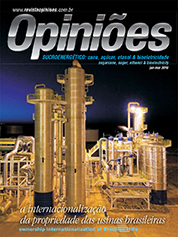Allan Simões Toledo
Vice-president of Banco do Brasil
Op-AA-23
Ownership internationalization of mills and its contribution to the Brazilian market
In the last four years, the sugar and ethanol industry experienced completely distinct phases. It lived through an accelerated expansion and then faced difficulties originating from the low sugar and ethanol price cycle, in turn aggravated by the effects of the international crisis brought about by the U.S. sub-prime loan crash, whose reflexes are still felt by companies in different industries around the world.
Actually, the sub-prime issue led to many financial institutions restricting credit offerings worldwide, contributing to the increase in market tensions. In Brazil, and contrary to the general trend, public institutions expanded credit availability, thus fulfilling their role as inducers of economic development. This posture was anchored in the economy’s good fundaments, contributing to Brazil having been one of the countries with the best performance during that turbulent period.
Notwithstanding the crisis, the sugar-based energy industry never ceased to be attractive. It maintained its status as an important source of alternative energy, within a context in which one increasingly predicts the shortage of energy from more traditional sources, particularly oil. Additionally, both ethanol and co-generated energy from bagasse are considered clean sources, viewed in the context of growing attention to environmental issues.
This source of wealth awakens in investors around the world the interest in participating in this important market. Whether foreigners or locals, such new investors, by directing their funds to Brazilian mills, are obviously seeking to make profit. However, in addition, they look for more control over production and over the destination of sugar and ethanol exports, as well as more participation in the production chain.
They also benefit the industry, for instance, by adopting corporate governance practices, a better capital structure and management professionalization. All these positive aspects contribute to a better perception of risk associated with the sugar and ethanol industry. Capitalization reduces a company’s cost of capital and allows access to clear and transparent information, consequently resulting in more credit availability and more adequate financing structures.
When upholding the equity participation of current mill owners in the business, such benefits are enhanced by the experience developed by Brazilian producers in the course of many decades of improvements to the industry, resulting in the consolidation of competencies that may bring about a new virtuous cycle in the sector.
Given its access to the distribution structure of large international groups, foreign investors may facilitate the penetration of Brazilian sugar and ethanol in new markets and, hence, assure the more effective and long-lasting presence of these products in the international market. However, in order to bring about more effective trade in our ethanol, one must first make it an international commodity, to then break down protectionist barriers set up by countries that refuse to source energy from beyond their borders.
Thus, the entry of new shareholders must be seen as an alternative upon restructuring or expanding large companies in the sugar and ethanol industry. One cannot ignore it. However, one must emphasize that intellectual capital remains intact, built up over centuries by industry representatives, which reflects in broad agricultural qualification, in the ability of mills of the sugar and ethanol industry to operate throughout the country, and in first class technology developed and currently exported to several countries.
It was this heritage that took the country to lead this industry in the world, with an unquestionable edge. Brazil should remain at this stage. Banco do Brasil believes in the industry. It holds a distinguished position in the financing of investments, notably as related to the passing on of funds from BNDES (National Economic and Social Development Bank) and agricultural credit lines.
Historically, in the agricultural area, it has supported sugarcane planting and cost financing; in the industrial area, the modernization of industrial units and investments in electric power co-generation, as well as the implementation of new projects, while in the capital market area, it has provided advisory services in operations involving the domestic and international capitalization of Brazilian mills. Our activities, including the creation and development of customized solutions, made Banco do Brasil one of the main advisory banks for structured deals in the sugar and ethanol industry.




